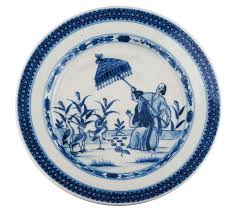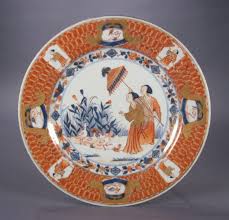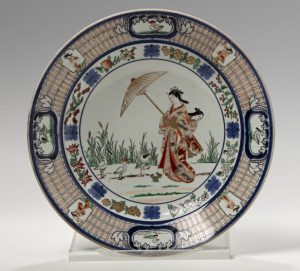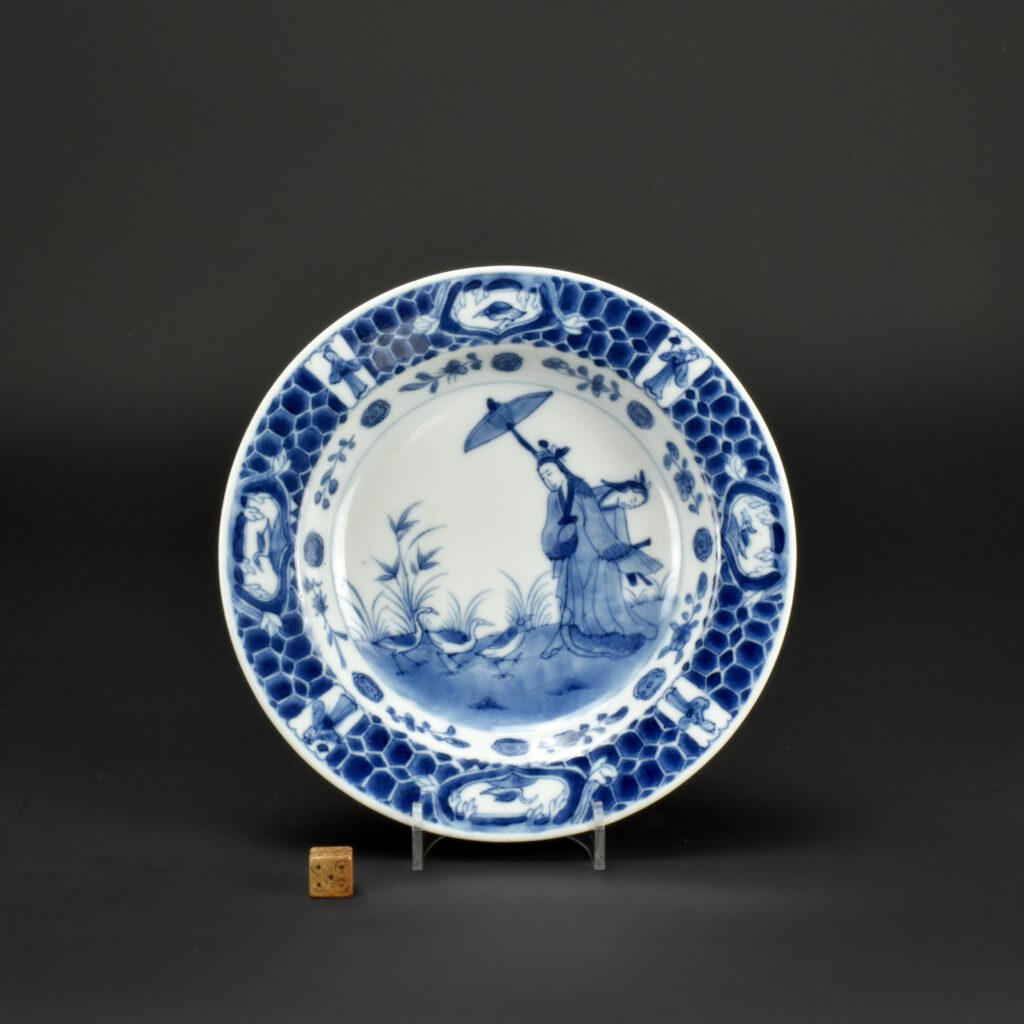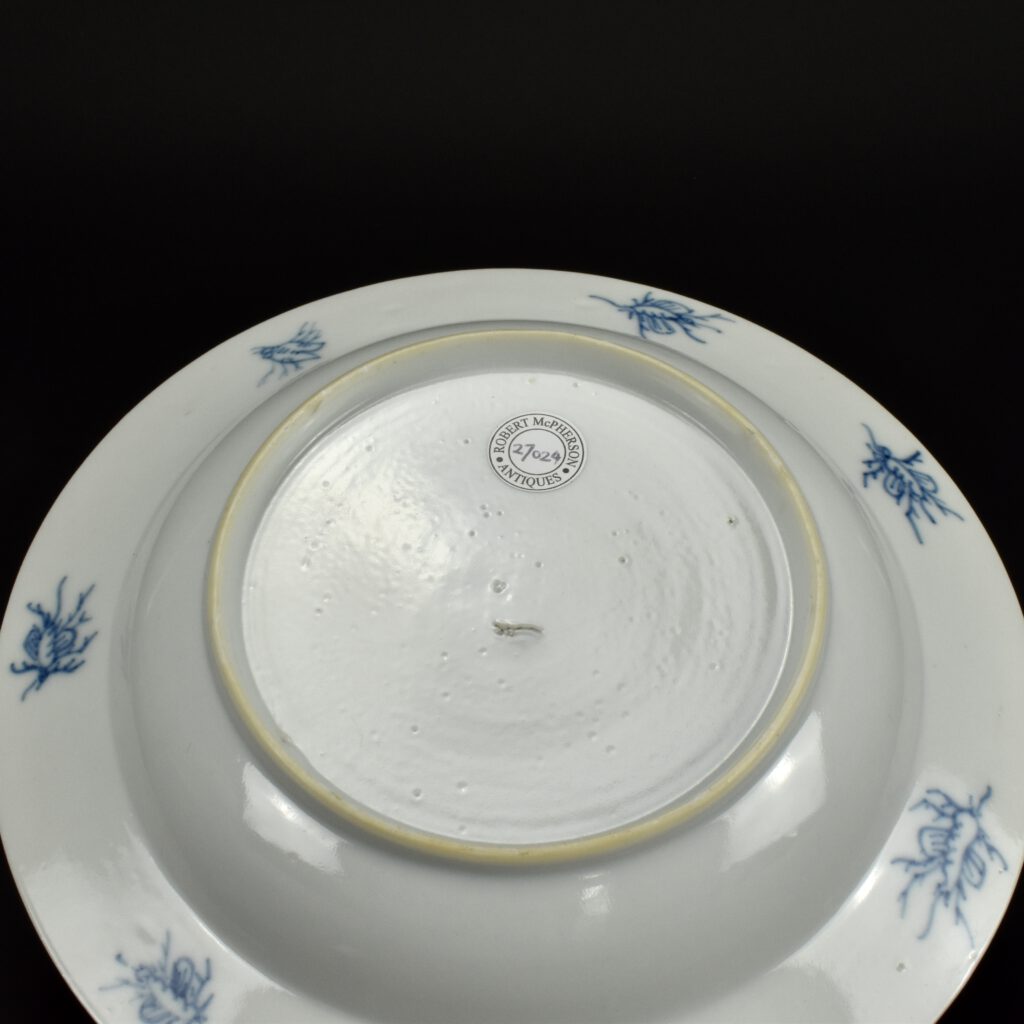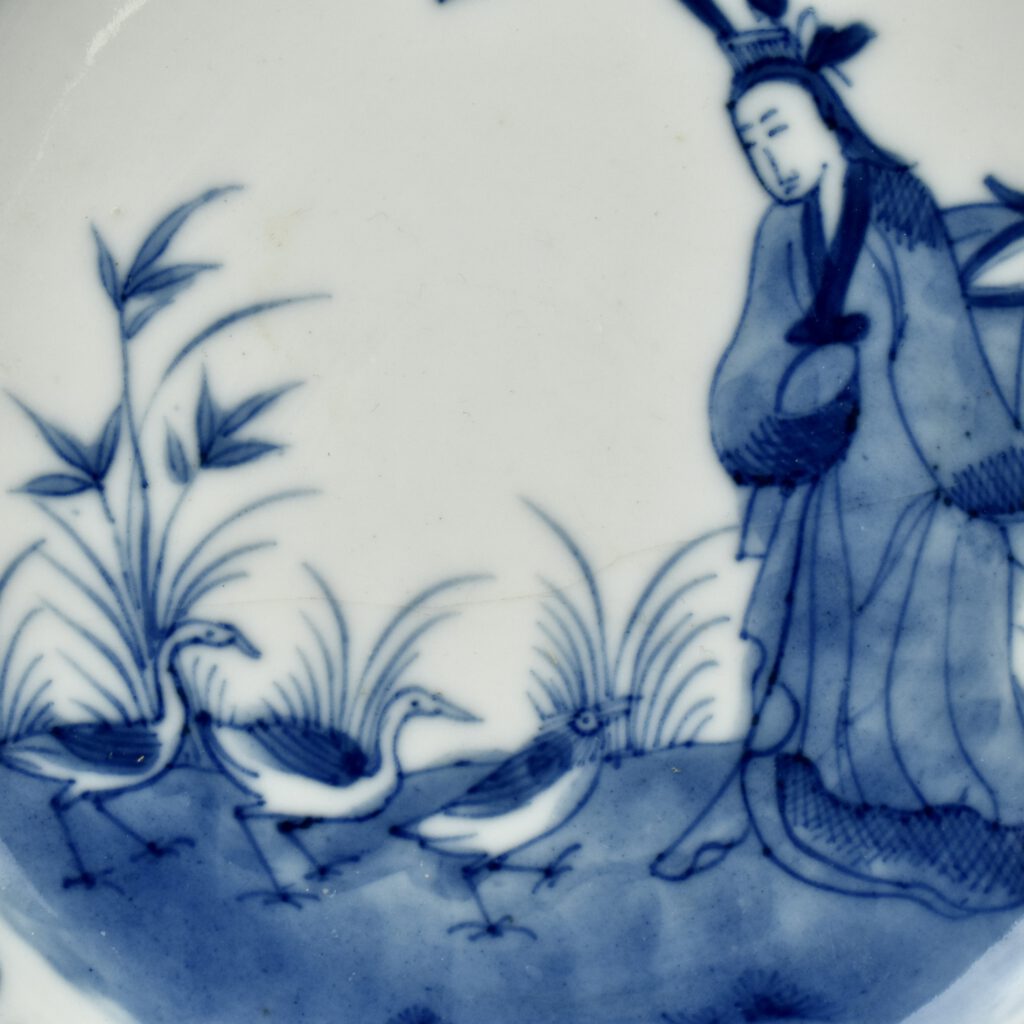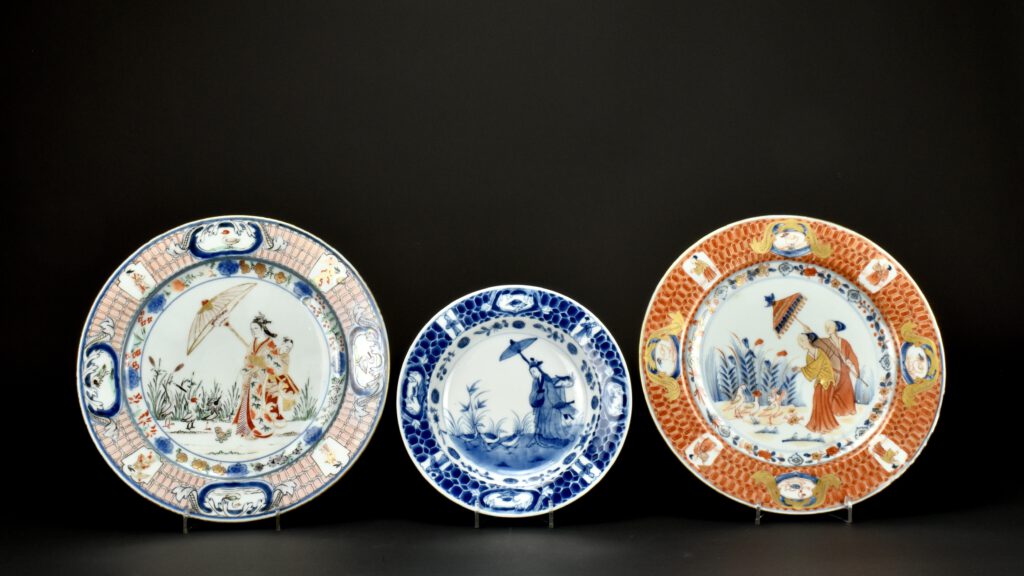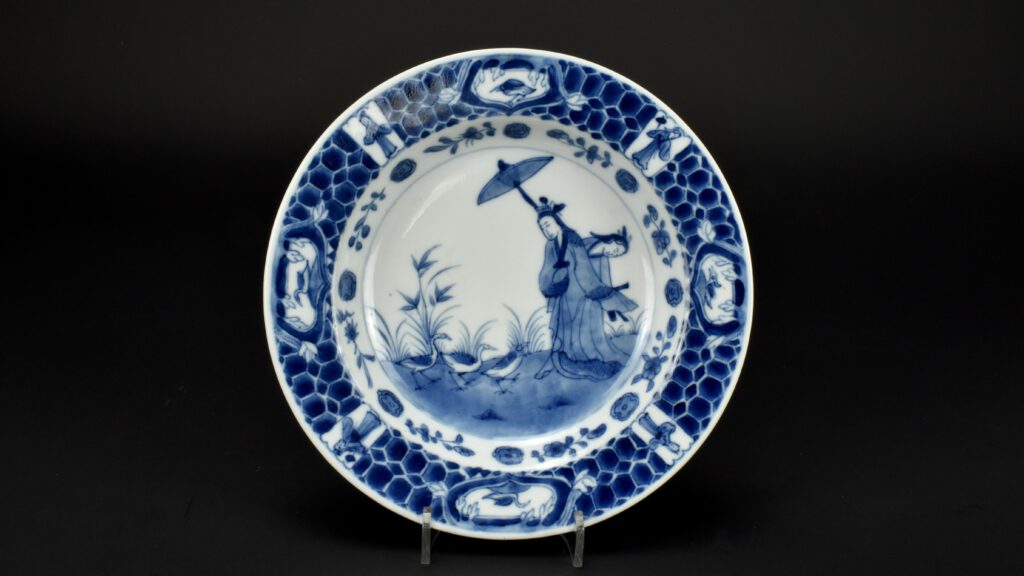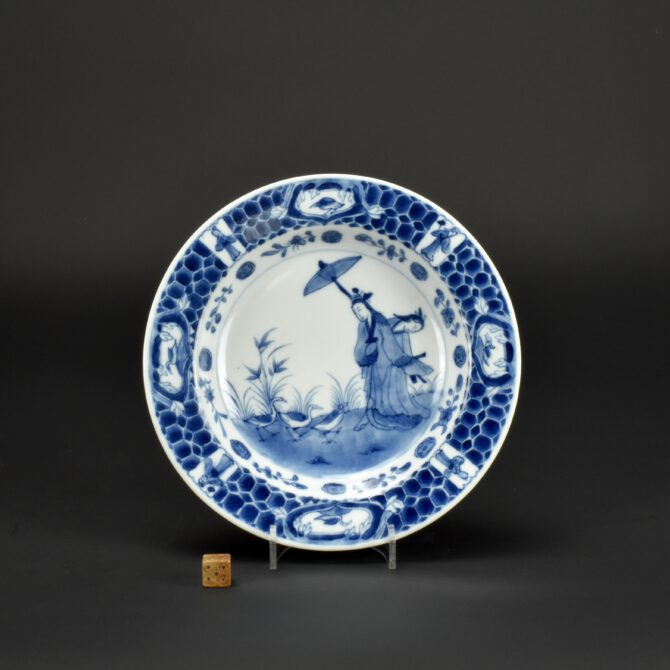
A Small Chinese Export Porcelain Pronk Design Blue and White Dish
A Small Chinese Export Porcelain Dish with Pronk’s Design ‘Parasoldames’, often referred to as La Dame au Parasol. This blue and white version of the well-known Chine de Commande design dates mostly dates from about c.1737 to 1760. However, I think this simplified version is a little later and perhaps dates to 1750-1770. It is Chinoiserie in style, which is rather strange to the Chinese painting the design. These tall elegant ladies with their parasol must have seemed rather quaint and exotic to the Dutch middle and upper classes when they were first seen in the Netherlands. Cornelis Pronk also known as Cornelis Pronck, was a Dutch draughtsman, painter and porcelain designer. He is known particularly for his numerous drawings of cities, towns and buildings (topographical drawings), as well as for his porcelain designs. In 1734, as an experiment, the Dutch East India Company board, the Heren XVII, commissioned the Amsterdam artist Cornelis Pronk (1691-1759) to design depictions for services and other porcelains. He then designed a chinoiserie, a depiction in Chinese style, featuring a Chinese lady at the waterside and a female servant holding an umbrella. These drawings with the designs, which are now known as the Parasoldames (the parasol ladies) were sent to Batavia and from there to China, where porcelain, decorated after this example, was ordered in 1736. The coloured drawn plate design has been preserved and is now part of the collection of the Rijksmuseum Amsterdam. The High Government ordered porcelain conform to these drawings in both China and Japan.
This porcelain, Chine de Commande, was produced in China, then shipped to Europe and sold by the Dutch. A set of blue-white plates, for instance, would sell for 1160 Dutch guilders – enough to buy a house in Amsterdam. Pronk made four different designs, of which ‘The Parasol Ladies’ was most popular. The Dutch East India Company ended the deal in 1740 because the production and shipping from China proved too costly. However, Pronk’s designs remained popular and were frequently copied, and some of his designs are still being produced. Four of Pronk’s sketchbooks are in the collection of the Rijksprentenkabinet (National Cabinet of Prints), now part of the Rijksmuseum in Amsterdam. In 1997, the Frans Hals Museum in Haarlem held an exhibition of Pronk’s work.
See Below For More Photographs and Information.
SOLD
- Condition
- There is a fine crack across the base, see Photograph Gallery Below.
- Size
- Diameter 17.8 cm (7 inches).
- Provenance
- Bought in Japan.
- Stock number
- 27024
- References
- For the original Pronk Designs of 'Parasoldames', often referred to as La Dame au Parasol, see : Chinese Ceramics in the Rijksmuseum, Amsterdam. The Ming and Qing Dynasties (Christiaan J.A Jörg in collaboration with Jan Van Campen. Rijksmuseum, Amsterdam. Published by Philip Wilson Publishers Limited 1997. ISBN 0-85667-489-3) page page 282, figures 318a and 328b.
Information
Cornelis Pronk 1691 – 1759
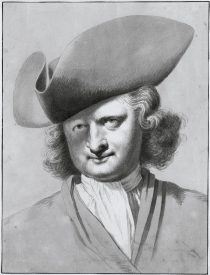
Cornelis Pronk, also known as Cornelis Pronck, was a Dutch draughtsman, painter and porcelain designer. He is known particularly for his numerous drawings of cities, towns and buildings (so-called topographical drawings), as well as for his porcelain designs.
In 1734, as an experiment, the Dutch East India Company board, the Heren XVII, commissioned the Amsterdam artist Cornelis Pronk (1691-1759) to design depictions for services and other porcelains. He then designed a chinoiserie, a depiction in Chinese style, featuring a Chinese lady at the waterside and a female servant holding an umbrella. These drawings with the designs, which are now known as the Parasoldames (the parasol ladies) were sent to Batavia and from there to China, where porcelain, decorated after this example, was ordered in 1736. The coloured drawn plate design has been preserved and is now part of the collection of the Rijksmuseum Amsterdam. The High Government ordered porcelain conform to these drawings in both China and Japan.
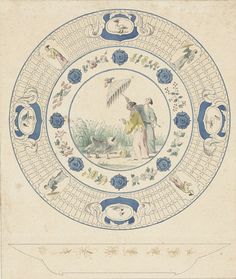
Pronk's original watercolour for the V.O.C. c.1734 to 1736.
